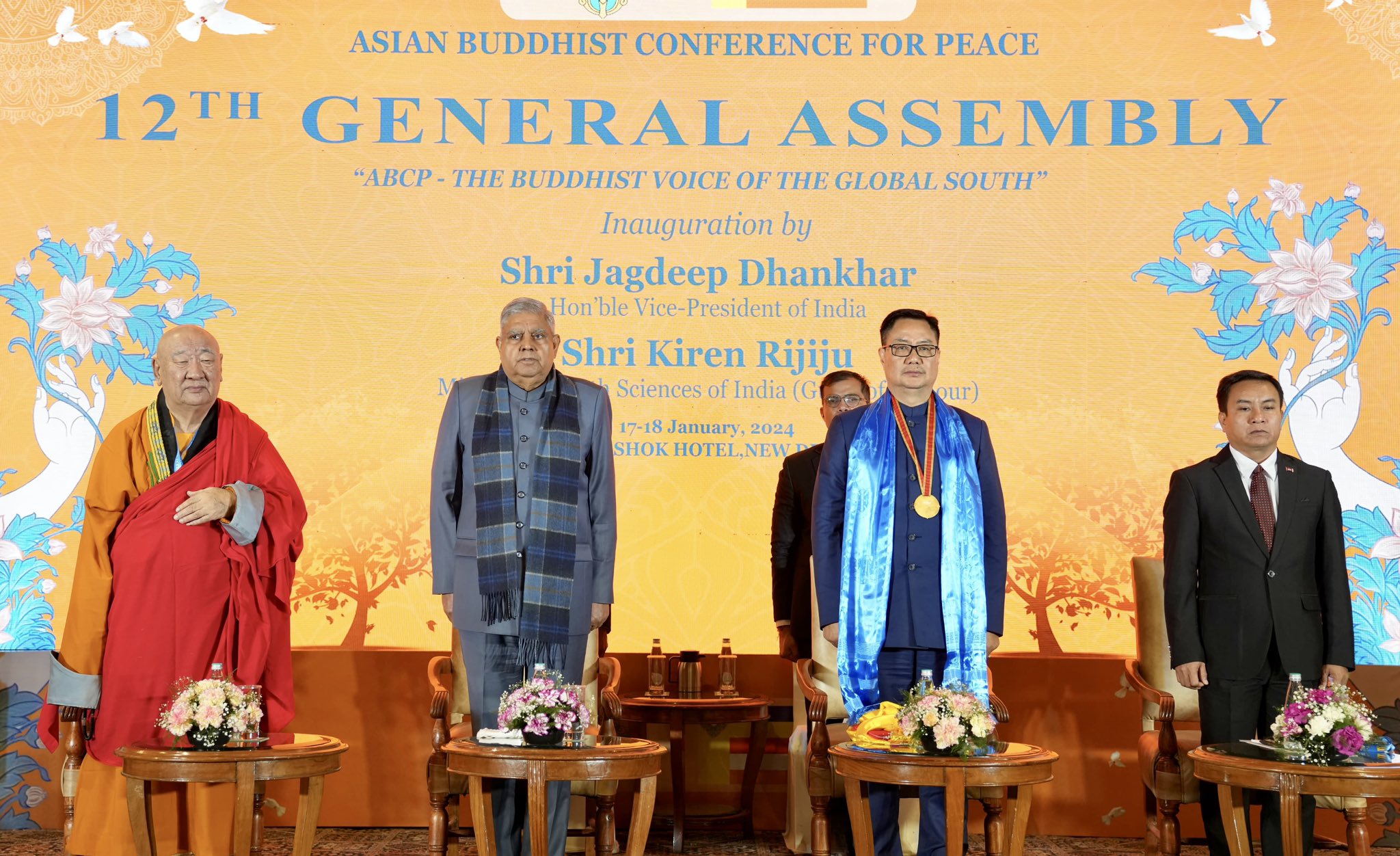Table of contents
The 12th General Assembly of the Asian Buddhist Conference for Peace (ABCP) commenced on January 17th, inaugurated by Vice President Jagdeep Dhankhar.

This significant event, taking place over two days in the bustling city of New Delhi, India, is a testament to the enduring power of peace and harmony promoted through Buddhist principles.
- Establishment: Formed in 1969 amid Cold War tensions.
- Headquarters: Located in Ulaanbaatar, Mongolia.
- Membership: Mongolia, India, Sri Lanka, Nepal, Bhutan, Thailand, Myanmar, Japan, South Korea, Cambodia, Laos, and Vietnam
- Activities: Organizes conferences, cultural events, and peace dialogues.
- UN Recognition: Accredited as an NGO and titled 'Peace Messenger' by the United
What is ABCP?
The Asian Buddhist Conference for Peace (ABCP) is an international organization dedicated to promoting peace, harmony, and understanding through the principles and teachings of Buddhism.
- Formation and Early Years
- The ABCP was formed in 1969 against the backdrop of the Cold War, a time when the world was grappling with political tensions and the threat of nuclear conflict.
- Its formation was influenced by the desire to promote peaceful coexistence and dialogue amidst global tensions.
- Guiding Principles
- The organization is grounded in the teachings of Lord Buddha, focusing on principles of peace, non-violence, compassion, and universal humanity.
- It seeks to apply these teachings to address contemporary global issues.
- Geographical Spread and Membership
- Initially, the ABCP's activities were primarily centered in Asian countries with significant Buddhist populations.
- Membership: Mongolia, India, Sri Lanka, Nepal, Bhutan, Thailand, Myanmar, Japan, South Korea, Cambodia, Laos, and Vietnam.
- Over time, it has expanded its reach and now includes members and participants from various countries across Asia and beyond.
- United Nations Recognition
- The ABCP's efforts in peacebuilding and promoting Buddhist values in the international arena have been recognized by the United Nations.
- The organization has been accredited as a non-governmental organization (NGO) by the UN and has been honored with the title of ‘Peace Messenger.’
We can't clear UPSC for you.
But with our personalised mentor support, you'll be ready to do it yourself.
Key Highlights of the Vice-President's Address at the 12th General Assembly of ABCP
- Shri Dhankhar welcomed the participants to the 12th ABCP General Assembly, recognizing its importance in a world undergoing historic and transformational changes.
- Theme of the Assembly
- The theme, "ABCP - The Buddhist Voice of Global South," was noted for its timeliness, coinciding with India's increasing role in global leadership and representation of the Global South, especially in forums like the G20 and the "Voice of Global South Summit."
- Message of Peace and Compassion
- The Vice-President underscored the message of peace and compassion embodied in Buddha's teachings.
- He quoted a momento's message, "May those who fight with arms in hands meet with flowers," reflecting the pacifist ethos of Buddhism.
- Buddhism's Influence on India
- Shri Dhankhar highlighted India's deep connection with Buddhism, referencing Prime Minister Modi's statement on India's contribution of 'Buddha' rather than 'Yuddha' (war) to the world.
- Educational Initiatives
- India's commitment to spreading knowledge about Buddha to younger generations was emphasized, including the development of the Buddhist circuit and the India International Centre for Buddhist Culture.

- Addressing Global Challenges
- The Vice-President called for a collective approach to tackle global issues like climate change, conflict, terrorism, and poverty, drawing upon Buddha's principles as a beacon of hope.
- Buddha's Teachings in Contemporary Context
- He stressed the contemporary relevance of Buddha's wisdom, particularly the Four Noble Truths and the Eightfold Path, as a roadmap for inner peace, compassion, and non-violence.
- India's Service-Driven Governance
- Buddha's teachings inspire India's approach to governance, focusing on citizen welfare, inclusivity, and environmental sustainability.
- Initiatives like the International Solar Alliance and Mission LiFE exemplify this commitment.
- Buddha's teachings inspire India's approach to governance, focusing on citizen welfare, inclusivity, and environmental sustainability.
- Vision for a Peaceful Future: The speech concluded with a call to build a future where peace is a shared endeavor, guided by Buddha's teachings of blessings, compassion, and welfare for all.
Shri Dhankhar urged the participants to champion Buddha's message proactively and develop a vigorous program of action for the betterment of humanity.
Previous Post